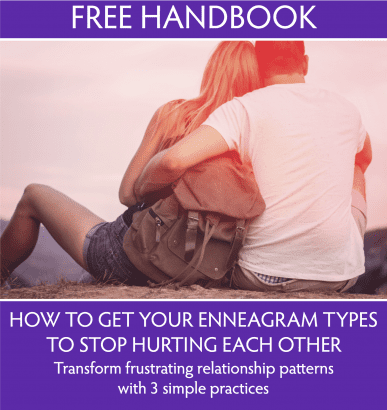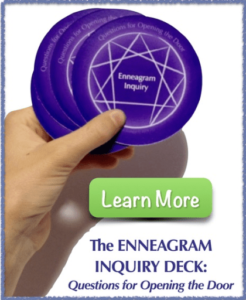There’s been a lot of stir in the US lately about “fake news” and “alternative facts.”
Not too many decades ago, people could relax to a certain degree into a defined religious, scientific, or other worldview and assume that it was substantial. Real.
Since then Western cultures have undergone ideological deconstruction and entered a postmodern era where “objective reality” and “absolute truth” are no longer sure bets. We still want to know what’s real or true, while some suggest we’ve entered a “post-truth” era.
It can feel disorienting and anxiety-producing to not know what information we can rely on- what path we can trust. Contemporary culture turns up the volume on our collective angst and simultaneously creates ever-more flashy ways of trying to deliver us from it.
How can we find our way through? Cling to the headlines of a political party? Harken back to some golden era? Profess that future solutions will take care of our troubles? Get more facts and data to put this to rest once and for all?
Trying to recapture an idealized past or imagining ourselves in a preferred future will not do the trick. What we need in order to find our way through is available to us right here and right now. It is a capacity intrinsic to us, even if no one ever taught us about it or how to “use” it.
I’ve learned to reliably find my way there by engaging the wisdom that the Enneagram points to.
Postmodern Paralysis
People today, even those self-identified as traditionalists, still have to wrestle with living in a world where different moralities and social constructs intersect and clash on a daily basis.
We are asked to doubt our perceptions, to try to make sense of multiple perspectives and be skeptical about what authorities are telling us.

Overall, this upsets us. It upsets our understanding of who we are and what the world is. It upsets our beliefs handed down through tradition. It upsets our ego’s kingdom and its instructions about how to operate in life. It can cause discomfort, anxiety and apathy. When we feel this upset, and don’t know where to go next, we can feel helpless, overwhelmed, and disaffected. No wonder people want to check out, smoke out, or freak out all over the place.
Reconstructing Real?
Perhaps the silver lining of suffering these deconstructed ideals and this disillusionment over the past decades is that the question of what’s “real and true” comes to the fore in a fresh way.
What did we even mean in classical or modernist times when we claimed something was real? Even in the 16th Century, Francis Bacon said, “The human understanding is like a false mirror, which, receiving rays irregularly, distorts and discolors the nature of things by mingling its own nature with it.” And in the 18th Century Johann Wolfgang von Goethe said, “Few people have the imagination for reality.”
In today’s world, increasingly diverse cultural contact has unveiled that what is true for one person or group does not necessarily fit for another. It has required us reflect on our assumptions and our biases. It has woken us up from relying on dualistic modern concepts that fit better when we can keep ourselves in similar group-identity enclaves and not have to encounter humanity’s fullness inside ourselves or out in our neighborhoods.
While we can feel fragmented and at loose ends when our values and perceptions are contradicted by those of others, this may be just the kind of “undoing” we need in order to find something deeper, “truer” if you will.
Maybe postmodern cultural angst has helped to take apart some of the strongest assumptions we hold so that we can listen past the identity politics and righteousness of our own moral positions.
What if our disillusionment, discomforting as it may be, is stripping us down of our old baggage to help us arrive at something more satisfying? What if there is something more waiting for us than having our values reflected by those in our community?
Ego Power-Trip
Your ego wants to keep your own personal world views intact. It’s one of its main tasks as you get socialized— to tell you what’s acceptable to display and what’s not, to repeat instructions about how to be safe and OK.
 For how complex and nuanced life is, this is a big job- especially for the mind of a child. The ego takes on the impressive task of trying to corral reality into predictable principles and to steer our actions using the simplified roadmap that it insists is the only way to go.
For how complex and nuanced life is, this is a big job- especially for the mind of a child. The ego takes on the impressive task of trying to corral reality into predictable principles and to steer our actions using the simplified roadmap that it insists is the only way to go.
Our Enneagram types may help us become experts at certain parts of the terrain, but there’s still that pesky reality to contend with that won’t follow our rules.
For example, as type Two, I may become very attuned to reading the other’s needs and having a knack at how to respond to them. But life confounds me every day in that this same attention doesn’t get returned to me. My ego tells me to do more and try harder, that I’m not enough. When that doesn’t work, my ego tells me the other is are unkind and not appreciative. It will come up with elaborate explanations to adjust its plan or increase its intensity. Anything but question the precepts it’s founded on.
We treat these deep beliefs that are underneath our types like an Ark of the Covenant, as though they contain the sacred precepts that will keep us in good graces of God or Life, or at least our ego’s approval.
I believe that a lot of what we’ve insisted on as true can and maybe even should fall away. But this doesn’t make me a untethered relativist. I also believe that reality and truth are all around us and within us, and that we can access them directly- not dependent on family grudges, partisan news media, particular pulpits or industry-funded research.
Our souls want to be tethered to deep and sacred truths. We are seeking this resonance all the time, whether through knowledge, relationship, service, philosophy, worship or science. This seeking is what I love about humanity. There is something in our nature that wants to experience what is good and true and beautiful. Like we’ve got homing devices for it.
I know, I know. This is not a very postmodern claim.
I’m saying that, through no fault of their own, our egos have it wrong. They developed to try to help us get a sense of grounding in something important, but by default they idolize a certain safety structure and mistake it for the real deal. This is like what troubles many about religion- that believers often mistake the signpost for the thing it is pointing to.
When our usual “truth” is confronted, we are likely to protest. Or point out enemies. Or say what’s good is being lost. Or try to make the rest of the world conform to our ways. And others will do the same to us.
As we get confronted as individuals and as groups, we experience an erosion of the surface layers of who we think we are and what we value, and we fear something is being lost or violated. But what if this surface scouring is paving the way for us to contact something else? What if there is something more here than we’d understood before?
When I don’t have the ability to resist or defend against the scouring river of life, or when I might have the grace to cooperate with letting my surface-level reactions be loosened, I can experienced something surprising.
It’s as though life is always eager to contact me, and when my defenses are down for a moment and I don’t panic, life comes and touches me. And the way it touches me is particularly attuned to the moment.
Transformational Suffering
Sometimes this magical turn is preceded by high distress. I remember a time when my husband, my three children and I all had a debilitating flu.
My youngest child was maybe six months old, and was not thriving to start with. Even without this illness, he had had problems breathing, feeding, and growing. I don’t remember ever having felt so profoundly ill myself- while responding to a crying child I fainted twice.
So I was truly compromised. I didn’t have the usual sense of capacity or strength I was used to. And neither did anyone else around. I couldn’t rouse my husband from his fever-coma.
Yet, there I found myself in the middle of the night, trying to soothe my baby, holding him to me while bouncing on my yoga ball. Barely able to hold myself upright, at a certain point, I almost fell over and dropped him. Horrified, I felt a surge of panic, and I proclaimed honestly: “I can’t do this.”
Then something surprising happened. I had surrendered and didn’t have hope of any resource to help me in my despair. Yet instantly after admitting my inability to continue on my own, I felt an energetic presence behind my back. I felt as though something or someone was supporting me directly. I was still as sick as ever, but I could lean into this support and feel physically held and emotionally not alone. I got the image of an enormous grandmother holding me in her lap. And we got through it, even though the illness was far from over.
Maybe your skeptical mind is thinking, yes- the flu can cause delusions. But I believe it took something like that illness to strip me of my usual identity and defenses. The parts of me invested in being independent and capable had to give way for me to open to something greater. I thought to myself, “Oh. This is why churches are full of older women. Those who have suffered long and have realized they don’t have to go it alone.”
Enneatype as Place Holder
As we become practiced at noticing the workings of our ego-structure, the structure can become more transparent and less insistent that its way is the only way.
This doesn’t sound attractive to some. Why would I want my personality to be less defined and less clear? It can feel threatening to want to loosen the tenets we have built our lives on. When we are identified with the personality, it feels like consenting to letting myself be eroded away.
Likewise, cultures can fear the dilution or dissolution of their ways. This is natural. As groups, and as individuals, we first need a strong self and a strong sense of values before we can start traveling to other lands and consider other ways. Imagine traveling internationally without a proficient ability to speak your own native language!
When we stick with our original conditioning, we get a temporary sense of identity and security, but if we pay attention, we notice that there is something unsatisfying about it after awhile. Like a mid-life crisis after devoting oneself to building a home, a family, or a sense of competence, there’s this knowing that there must be more to life. So our Enneagram types, our personality structures, are like place holders or scaffolding that help us get to a certain level of functioning, so that we can eventually not rely on them.
Then we want something more expansive than the usual confines we keep ourselves in, and often are tempted to seek out something or someone out there to deliver us. My interest is in how we can find the expansion in here, since it seems that when we do, the panicked seeking can be met and be released, and something else can come online.
Getting more awareness and choice about our patterns can be liberating and invigorating. At type Five, for example, I can begin to see my retraction from the world as a defense that is often no longer needed or effective in protecting me in the way I once thought it did. While the impulse may still arise, I can notice it and find a way to stay engaged that doesn’t overwhelm me.
I see it like this, developmentally:
- Once I have a solid-enough ego structure, I can develop the capacity to see how and when my patterns do and don’t serve me.
- Once I can notice this, I can sense that there is more to me than just my personality.
- When I sense into that, I can choose to cooperate with life in the way it wants to expand me- cooperating with the loosening or erosion I used to fear.
It’s like I’ve taken myself to be a rock and don’t want anything to chip away at me or rub me smaller. Yet a defended stance against life’s weathering prevents me from experiencing the richness of my deeper layers. My essence is like the crystals inside the geode, my personality the outer layer that has housed it.
Leaning In to the Real
As we feel less identified with and determined by our Enneagram type programs, we can start to feel into other truths about ourselves and about life.
I’m suggesting that when we are not clobbered with the habitual interpretations of our personality, we can see things in ways that ring more “real” and “true,” different from repeating variations of our familiar life narrative.
I offer the following practice intended to help us open to fresh ways of perceiving ourselves and the world around us. This exercise is meant for folks who have some experience working with their inner observer and with “grounding” themselves.
** If you have a significant trauma history, I’d recommend trying this process with professional help.
Opening to the Real in You
- Be on the lookout for places where your Enneagram type is uncomfortable. Maybe you notice judgment, resistance, anger, despair, agitation, or something else.
- When you find it, see what sensations you can notice in your body and where they show up. Is it tight in your chest? Dense in your head? Vacant in your belly? Hot? Cut off? Vibrating? Something else?
- Gently gather your attention, presence and breath around the area(s) where the sensations collect. Simply be there with your experience, acknowledging it, and continuing to breathe.
If the discomfort is intense, try moving your attention away a bit to what feels like a tolerable distance from the sensations- where you are not abandoning them, but not getting overwhelmed by them. If you get caught in them and identified with them, back off, re-ground yourself and breathe. If you want to try again, wait until your nervous system is steady and then proceed slowly.
4. When you can be present with the sensations, feel into your feet again, remembering your contact with the ground. Then open to what else might be here. You may want to practice this with each of your three centers (head, heart, belly). This is not a time to control your experience to conjure something you’d prefer or predict. This is a time to become quietly receptive to an intelligence beyond your usual trappings. Sometimes it will come as an insight, sometimes a feeling of being touched physically or emotionally in a certain way, sometimes as “strangeness.”
5. See whether you can allow what’s arising to touch you in some way, to inform you, even to disarm you perhaps. Notice whether your current experience affects how you usually perceive or interpret things.
If this is hard to do the first time you try it, don’t be discouraged. Attending to your subtle inner terrain requires learning to pay attention in a way that often isn’t cultivated in our families, schools, or even spiritual paths.
So with this exercise am I suggesting that heading into your subjective experience will connect you with something more universally real and true? This is the opposite of how we tend to think of truth in the modern, scientific world. In some ways I am saying this, in some ways certainly not.
What the wisdom of the Enneagram shows us so clearly is that relying on our habitual inner perceptions to understand reality is typically shaky ground. But, when I can relax my usual inner network commentator and my usual inner studio audience, something else can be picked up on the amazing instrument of myself. My experience has been that when I receive this fresh kind of transmission or life-“frequency,” it not only rings more true and real than my usual estimation of things, but it even changes what I understand true and real to mean.
I don’t mean to set this up as a polarity. It can be tempting to see the ego as “bad” or “false” and our essence as “good” or “true.” It takes discipline and practice to learn to sort out what is habitual and what is fresh in us. They have very different feelings in the soul. This practice is about seeing whether you can enter the direct experience, sense the distinction of the usual and the fresh, and notice how these each affect you.
When Marcel Proust said, “All the mind’s activity is easy if it is not subjected to reality,” I believe he points to how our patterns want to persist, even when they clash with what’s needed in “real life.” And I would also say that the mind’s activity, while in some ways compelling to follow and easy to repeat, could be seen as not actually easy at all, but rather taking up tremendous energy and effort. We’re just used to it.
It is heartening to me that when I can move through and beyond my initial, automatic reactions, I can find my way to a place that is easier after all- at least for my soul. No, it’s not very post-modern of me, but I believe this ease happens when my soul is aligned with what’s true on a profound level, and when my ego-pattern stops resisting the nature of things.
I’d love to hear about your experiences of sorting out your ordinary conditioned experience and what happens when the pattern is softened and you can sense into something else.
Here’s to the truth under our usual perceptions!









